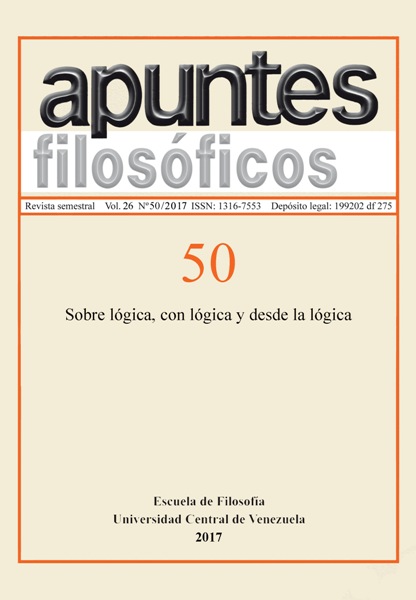Intuición y ecthesis: la exégesis de Jaakko Hintikka sobre el conocimiento matemático en la doctrina kantiana
Palabras clave:
ecthesis, intuición, conocimiento matemático, Ecthesis, Intuition, Mathematical knowledgeResumen
Hintikka considera que la “Deducción trascendental” incluye la búsqueda del papel que cumplen los conceptos en el esfuerzo que significan las actividades humanas de adquisición del conocimiento; así afirma que los principios que gobiernan las actividades humanas del conocer pueden ser reglas objetivas que pueden llegar a ser condiciones trascendentales de la experiencia y no condiciones contingentes producto de la naturaleza de los agentes humanos involucrados en el conocer. En su opinión, la intuición tal como es usada por Kant no se debe entenderse de forma tradicional, es decir, como productora de imágenes mentales, sino más bien como aquello que en la mente representa a un individuo. Para sustentar esta interpretación se remite a las lecciones de lógica kantianas, a la individualidad espacio-tiempo y a las tesis, presentadas en el ensayo premiado del año 1764, que caracterizan el método matemático por el uso de representantes particulares de conceptos generales. Así, su exégesis considera que las concepciones kantianas de la “Doctrina del método” no son concepciones posteriores, como se interpretan tradicionalmente, sino concepciones anteriores a la elaboración de la “Estética trascendental”. El presente artículo reconstruye parte de sus argumentos que a la postre igualarán a la intuición kantiana con la ecthesis euclidiana.
Abstract
Hintikka considers that the “Transcendental Deduction” includes finding the role that concepts in the effort is meant by human activities of acquiring knowledge; and it affirms that the principles governing human activities of knowledge can be objective rules that can become transcendental conditions of experience and no conditions contingent product of nature of human agents involved in the know. In his opinion, intuition as it is used by Kant not be understood in the traditional way, ie as producer of mental images, but rather as that which the mind represents an individual. To support this interpretation refers to the lessons of Kant´s Logics, to individuality space time and the thesis, submitted the winning essay in 1764, characterizing the mathematical method by the use of particular representatives of general concepts. Thus, his exegesis considers the Kantian conceptions of the “Doctrine of Method” not later conceptions, as traditionally interpreted, but prior conceptions to the processing of “Transcendental Aesthetic”. This article reconstructs some of their arguments that eventually will equal the Kantian intuition with the Euclidean ecthesis.

